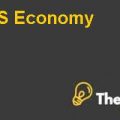Introduction
The primary electricity and fuel providers plays, an important role in social and economic development of a country.It provides, the governments with several arguments and opportunities, in favor of maintaining a tight control over the energy prices and subsidizing the energy prices. In this way, the government maintains a tight control of the energy sector. Lower prices of energy, such as higher quality fuels and electricity helps the lower income groups of the market, to gain an access to the modern forms of energy(Abdelrahim, 2009).
Maintaining the control of the energy also helps the governments to protect the income distribution of the low-income groups, in the lowest parts of their countries. Thus, they contribute to poverty alleviation. The control of the energy prices, by the governments, helps the government to offset the price fluctuations of commodities and promotes the smooth consumption against the wide price changes within the international markets(Abdelrahim, 2009). Those countries that are income rich make use of the low energy prices, as a tool for distributing the state benefits among the state population, without developing income testing or extensive administrative capabilities(Bezdek, 2012).
When it comes to controlling the prices of energy, the Arab world is no exception. The governments have been using the most implicit and explicit subsidies on the most common forms of energy – electricity, natural gas, oil products and crude oil, for characterizing and controlling the energy price environment in their countries for decades. The Arab region is also defined by its remarkable degree of economic and political diversity.It is reflected in the different types of the economies, which range from the major energy importing countries like Morocco, Lebanon and Jordan to the largest hydrocarbon exporters of the world such as Qatar and Saudi Arabia(Guillaume, 2011).
There is a complete range of the political and economic context that characterizes the Arab world, as a region that is rich in experience with regard to the effects of the reforms in the energy price policies and the changes of the subsidy reforms for the energy prices(Economist, 2013). This research paper focuses on the effects of decreasing the energy subsidies on the profitability and advantage of Saudi Arab corporations.
The aim of this paper, is to research the main effects of reducing the subsidy on energy costs in Saudi Arabia. The decline or the removal of the energy subsidies usually induces energy price shocks, within the countries and it affects the households and the firm’s altogether. Latest research shows that, the costs of energy subsidies have started to outweigh their perceived benefits. All the countries around the world, are today seeking for reforms for their energy subsidy policies, with the support of many international organizations.Such as Asian Development Bank, International Monetary Fund, World Bank and Organization for Economic Cooperation & Development(Elaian, 2011).
Supporting Literature
Energy Subsidy is defined, as the action of the government in pricing the energy of a certain country, with the objective of reducing the prices of energy for the producers and consumers below the market price.And it leads to a deficit in the budget of the public..............
This is just a sample partical work. Please place the order on the website to get your own originally done case solution.











